IRGC Navy increases combat readiness as US beefs up Mideast presence
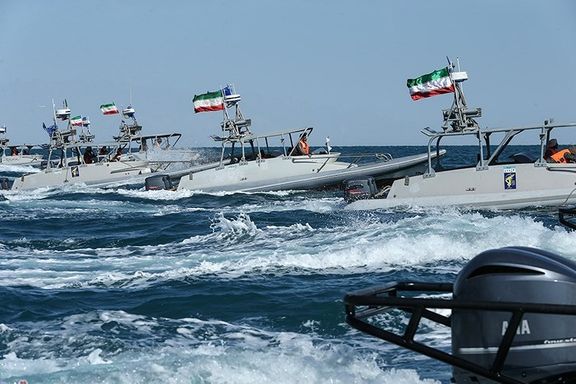
Iran’s Islamic Revolutionary Guard Corps (IRGC) Navy commander said combat readiness is the top priority for the coming year, citing a direct order from the Supreme Leader.

Iran’s Islamic Revolutionary Guard Corps (IRGC) Navy commander said combat readiness is the top priority for the coming year, citing a direct order from the Supreme Leader.
"Combat readiness and combat capability are our priority, because it is the order of the Supreme Leader," said Alireza Tangsiri in an interview with ILNA news agency on Sunday.
Tangsiri also elaborated on the Navy's plans to incorporate artificial intelligence into its weaponry, saying, "We must definitely be equipped with artificial intelligence, and this is a necessity for our work, which is happening."
He added, "The flag of this work, thank God, is in the hands of the Supreme Leader, and the knowledge of this work is in the hands of the Supreme Leader, and God willing, the dear young people will continue this work."
His announcement comes as the United States prepares to significantly increase its naval presence in the Middle East, a move directly tied to escalating tensions with the Iran-backed Houthi rebels in Yemen.
US Defense Secretary Pete Hegseth has ordered two aircraft carrier strike groups to the region next month, a rare deployment intended to bolster US strikes against the Houthis, whose primary benefactor is Iran.
The buildup follows persistent Houthi attacks on commercial and military vessels in the Red Sea, which the group frames as a response to the Israeli war in Gaza.
These attacks, which began in November 2023, have included missile and drone strikes on over 100 vessels, resulting in the sinking of two ships and the deaths of four sailors.
The extended deployment of the USS Harry S. Truman and the expedited arrival of the USS Carl Vinson will provide US commanders with increased capacity for patrols and strikes.
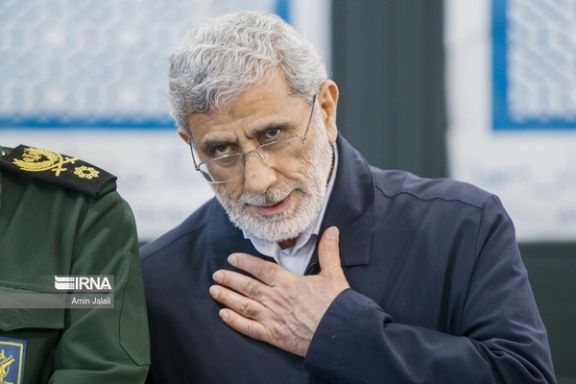
Esmail Qaani, commander of Iran’s Quds Force, told leaders of armed groups in Iraq not to take any action in response to threats from the United States and Israel during a recent trip to Baghdad.
According to Asharq Al-Awsat, Qaani’s message was also passed on to Yemen’s Houthis via intermediaries in Iraq.
Multiple meetings were held during Qaani’s visit, most of them in the Iraqi capital, according to reports received by Iran International.
According to Iraqi outlet Shafaq News, Qaani arrived in Baghdad last Wednesday for high-level talks with several key actors.
Among those in the talks were leaders of the Coordination Framework, a coalition of Iran-aligned Shia political parties; commanders of armed factions linked to Iran; members of the Popular Mobilization Forces (PMF), an umbrella group of mostly Shia paramilitaries integrated into Iraq’s security forces; and Iran’s ambassador to Iraq, the IRGC linked Mohammad Kazem Al-Sadegh.
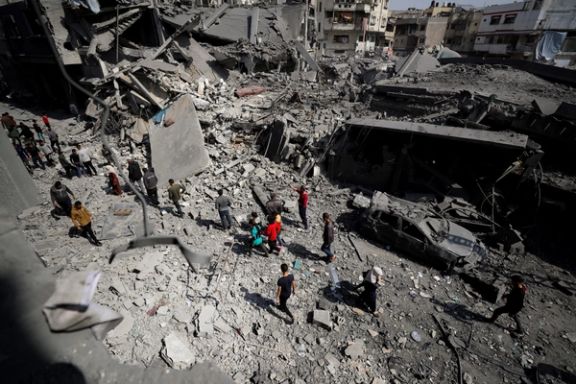
The head of a leading Israeli intelligence research center says Iranian support for Hamas in Gaza has been hampered since the war began, as the strip has been locked down, with efforts now refocused on Tehran's allies in the West Bank.
“Iran has a big problem to bring supplies and physical support to Gaza now because it’s closed so nobody can get anything inside, like ammunition,” said Shlomo Mofaz, the head of the Meir Amit Intelligence and Research Center in Israel
Speaking to Iran International, he said: “Maybe some things are being smuggled with the aid, or food, or from Egypt by UAVs, but mainly they have a problem. The main focus of Iran is the West Bank, where there are a few ways they are supporting Hamas and other groups, mainly from Jordan where there is a long border and no fence in many places.”
Since Iran-backed Hamas invaded Israel on October 7, 2023, killing around 1,200 mostly civilians and taking 251 hostages to Gaza, the Israeli military has locked down the strip’s borders amid the longest Gaza war since the Islamist group took control of Gaza in 2007.
After several weeks of ceasefire, last week, Israel resumed military operations in Gaza in a bid to put pressure on Hamas to release the dozens of remaining hostages in the strip.
In 2022, now assassinated Hamas political leader Ismail Haniyeh told Al Jazeera that his group had received $70 million in military help from Iran. "We have rockets that are locally manufactured but the long-range rockets came from abroad, from Iran, Syria and others through Egypt," he said.
The US State Department estimated in 2020 that Tehran’s support for Palestinian terror groups, including Hamas, reached $100 million a year.
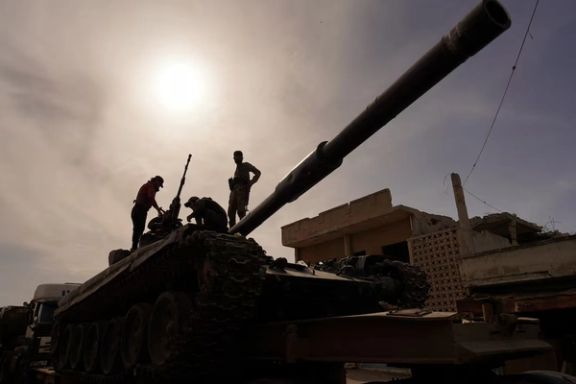
“The smuggling to the West Bank starts in Syria to Jordan but since the change in regime, it’s a bit harder there too as Israel has more control over what’s going on in southern Syria, but there are still some groups continuing,” added Mofaz, a leading intelligence expert in Israel.
However, financial aid is continuing through the likes of Bitcoin so Iran-backed armed groups such as Hamas and Islamic Jihad in the West Bank can buy arms on the black market.
He explained that much of the activity involves collaboration with Arab criminal groups inside Israel, who help smuggle ammunition into the West Bank. While some weapons are also assembled using commercially available materials, he noted this is less significant.
He added that Iran continues to smuggle dollars, but doing so has become more difficult. With no IRGC presence currently in Syria, the supporting infrastructure has been greatly reduced since the fall of the regime.
Just last month, Israel's defense minister announced that its war on Iran-backed groups in the occupied West Bank could go on as long as another year as Tehran refocuses its efforts in the wake of the Gaza war.
Speaking about the operation named 'Iron Wall, Defense Minister Israel Katz said: "We will not return to the reality that existed in the past. We will continue to clear refugee camps and other terrorist hotbeds in order to dismantle the battalions and terrorist infrastructures of extremist Islam that were built, armed, financed and trained by the Iranian axis of evil."
Mofaz said that from the Israeli side, security and military agencies have been working hard in the West Bank. “The intelligence is very good, much better than it was in Gaza before the war,” he said.
Overall, Mofaz says Iran’s allies, known as the ‘axis of resistance’, in Syria, Lebanon and Gaza have been significantly weakened, aided by the fall of the Assad government in Syria which has taken away a major military stronghold for Iran abroad.
“Iran has less air defense to defend from US and Israeli airstrikes after Israel’s last attack,” Mofaz said. "The change in the regime in Syria is another issue. The routes on the ground to Lebanon have been closed. By air, that’s also difficult from Damascus now.
The IRGC's influence has been significantly curtailed since Assad's ousting from Syria. Israel has repeatedly targeted the Syria-Lebanon border, particularly the tunnel network, and the Lebanese army now controls the country's borders following the US-France brokered November ceasefire.
As Iran explores Iraq and Turkey as alternative routes, these options are drawing increased attention, particularly after Israel exposed the Turkey route and warned against its development.
Regional experts broadly agree on the weakening of the so-called axis. However, Arman Mahmoudian, a GNSI research fellow and USF lecturer, argued in a January Stimson Institute article that a weakened Iran could increase the nuclear threat.
”There is growing concern that a weakened and increasingly vulnerable Iran, governed by a survivalist regime, may see no alternative but to weaponize its decades-long nuclear program,” he warned.
“While the Axis of Resistance is now significantly weakened, its diminished state still presents considerable dangers for the United States’ position in the Middle East and the broader stability of the region. A fragile Iranian regime, desperate to survive, may become an even greater source of instability.”
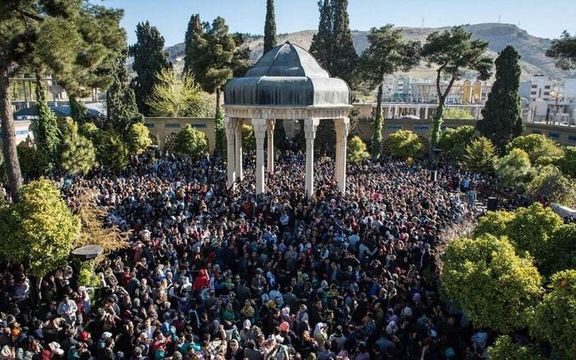
Iranian judicial authorities have announced arrests and legal action against individuals who took part in New Year’s celebrations at historical sites, accusing them of desecration, disrupting public order, and violating Islamic norms.
The gatherings in Fras Province and the religious city of Mashhad were marked by dancing and anti-government slogans, as well as expressions of support for the former Pahlavi monarchy.
Kamran Mirhaji, the Fars provincial prosecutor, said Sunday that legal cases had been opened against several participants and that further action would follow the completion of investigations.
During the New Year’s celebrations, crowds at popular tourist sites—including Persepolis, the tombs of national poets Hafez and Ferdowsi, and the Omar Khayyam mausoleum—were seen dancing and chanting anti-government and pro-Pahlavi slogans.
Videos circulating online showed crowds at Persepolis chanting "Long live the Shah." At the tomb of Ferdowsi, attendees were heard chanting slogans such as "The tyrant is overthrown, the Shah is coming home," "This is the final battle, the Pahlavi is returning," and "Woman, life, freedom.”
Hassan Hosseini, the governor of Mashhad, said on Thursday that a small number of people who disrupted the New Year's ceremonies had been identified and would face what he called appropriate judicial action.
Additionally, the director of the Tus cultural heritage site announced the closure of the Ferdowsi tomb complex on the Ramadan days, coinciding with the anniversary of the first Shia Imam's death.
In Neyshabur, large crowds also celebrated the New Year at the Khayyam mausoleum, where attendees chanted "Reza Shah, bless your soul."
Similar gatherings with chanting and singing of Iranian songs were reported at other tourist sites.
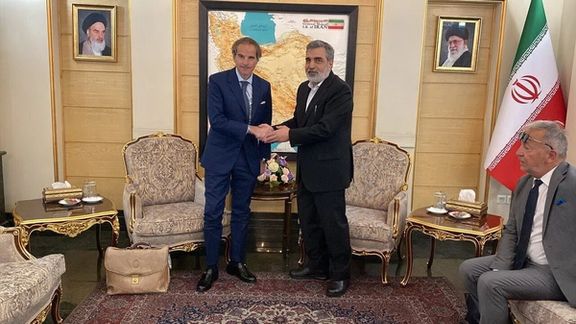
Iran will not yield to Western pressure regarding its nuclear program, a senior Iranian nuclear official said, warning that such pressure could have adverse effects on cooperation.
Behrouz Kamalvandi, spokesman for the Atomic Energy Organization of Iran (AEOI), emphasized Iran's determination to advance its nuclear industry and counter what he described as unjust accusations from Western powers.
"The Islamic Republic of Iran is firm and resolute in asserting its rights," Kamalvandi said in an interview with the AEOI's public diplomacy and information center on Sunday.
He criticized what he called negative propaganda against Iran's nuclear activities, asserting that Iran is subject to the most extensive inspections globally and maintains a transparent program.
He defended Iran's decision to suspend some JCPOA commitments, citing the US withdrawal from the deal in 2018 and the failure of other parties to uphold their obligations.
"Fifteen consecutive IAEA reports confirmed Iran's compliance with its commitments," Kamalvandi said. "We waited a year after the US withdrawal, but ultimately, we exercised our rights."
While Tehran has reduced IAEA inspections since 2021 and in 2023 barred a third of the inspectors, it continues to argue that its nuclear activities are peaceful.
IAEA Director General Rafael Grossi recently said the UN body was willing to assist Iran in proving it was not seeking nuclear weapons.
Kamalvandi warned Western nations that pressuring Iran would be counterproductive. "We hope that Western countries, who have tested Iran many times, have now realized that pressure on the Islamic Republic of Iran is ineffective and may even have the opposite effect," Kamalvandi noted.
"A nation with a history of thousands of years cannot be addressed with force," he added. "We have endured and overcome numerous pressures throughout history, and we will emerge victorious from the current ones."
Kamalvandi highlighted Iran's achievements in nuclear technology, including advancements in reactor and power plant construction, and strengthened relations with countries like China and Russia.
He also pointed to the successful hosting of an international nuclear science and technology conference in Isfahan, attended by International Atomic Energy Agency (IAEA) officials.
Iran has enriched uranium to up to 60% fissile purity, closer to the 90% needed for a bomb.
Iran's uranium stock refined to up to 60% grew by 92.5 kilograms (kg) in the past quarter to 274.8 kg, one of the IAEA reports said. According to an IAEA yardstick, the amount is enough in principle for six nuclear bombs if enriched further.

It starts with a text message on social media by an established cafe. A few million rials deposit, and a promise of a night unlike any other in Tehran.
In a city where theocratic authorities dictate dress codes and public behavior, a parallel universe comes alive after dark—one where music pounds, glasses clink, and young Iranians carve out their own kind of freedom.
“You have to pay some money in advance and reserve your place,” the organizer of a cafe tells us.
“How much?”
“Fifteen million rials ($17). It will be deducted from your table invoice at the end. We also charge each person seven million rials ($8) for the special service.”
Special service. A vague but enticing phrase that means DJ performances, fireworks, and, most importantly, a space where the Islamic government's restrictions on dancing, drinking and mixed-gender gatherings don’t apply.
A city of two faces
By day, Tehran echoes with debates in parliament, where bearded and grey-haired hardliners push for tougher hijab enforcement laws. Police cameras scan the streets, automatically fining women who dare to drive without a headscarf. But by night, in certain corners of the city, a different reality takes shape.
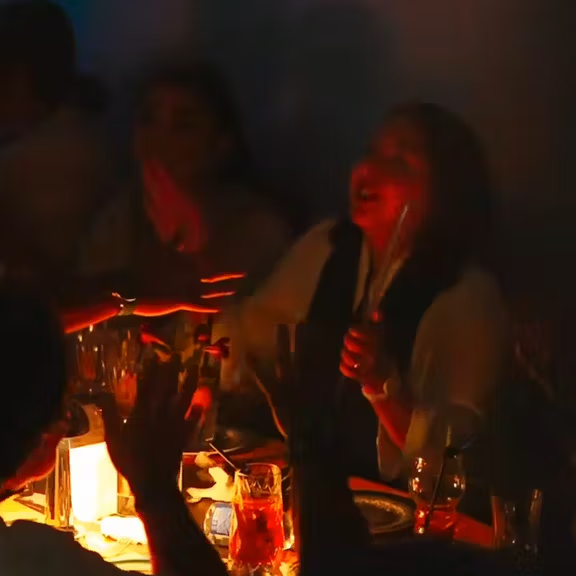
Our night begins with a purchase. Alcohol is banned in Iran, but an underground network ensures that everything from Chivas scotch to homemade Aragh Sagi (Iranian vodka) is readily available—for a price.
Farid, our contact, offers original whiskey bottled abroad for up to 150 million rials ($170) and vodka smuggled into Iran for half that price. "Or you could take my own homemade Aragh Sagi,” he suggests, referring to a type of Iranian moonshine.
Laughing, I ask, “Are you sure we won’t go blind?”
“Bro, I’m not a con. Buy an ethanol test kit online and check it yourself,” he says.
A bottle in a plastic bag is tossed into our car from a passing motorcycle. No words, no exchange. The deal is done for 500,000 rials ($6).
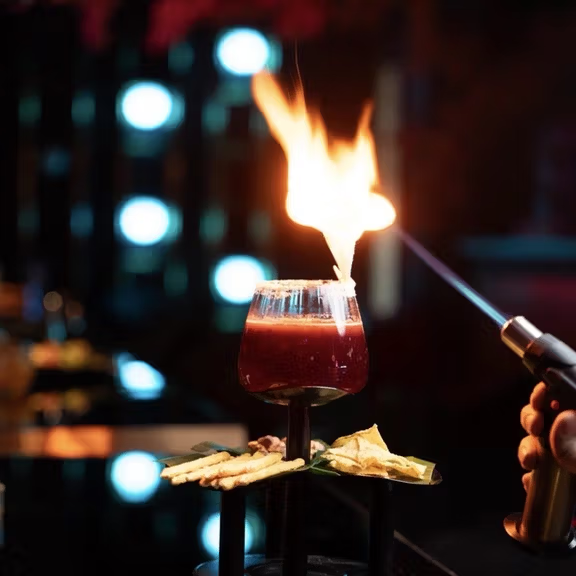
The club behind closed doors
The location is in Saadatabad, one of Tehran’s affluent northern districts. We arrive to find a nondescript door with no sign of activity. No doorbell, just the entrance bears the name of the café-restaurant. Then, from behind a tree, a guard emerges, unlocking the way into a hidden world.
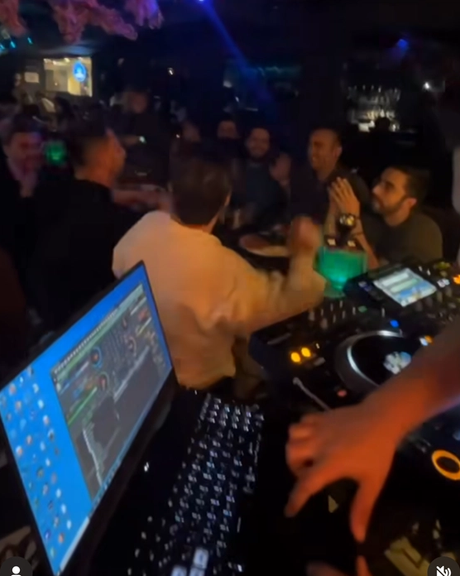
Inside, 300 to 400 people sit shoulder to shoulder. The air is thick with music, laughter, and the clinking of glasses. Nearly every table has bottles—of what appears to be mineral water—being discreetly poured into soft drinks.
The DJ takes the mic: “I do hope the day you’re waiting for arrives very soon.” The space erupts in cheers, everyone knowing exactly what he means.
A song dedicated to those killed in the Woman, Life, Freedom protests plays, and the energy shifts—defiant, unbreakable.
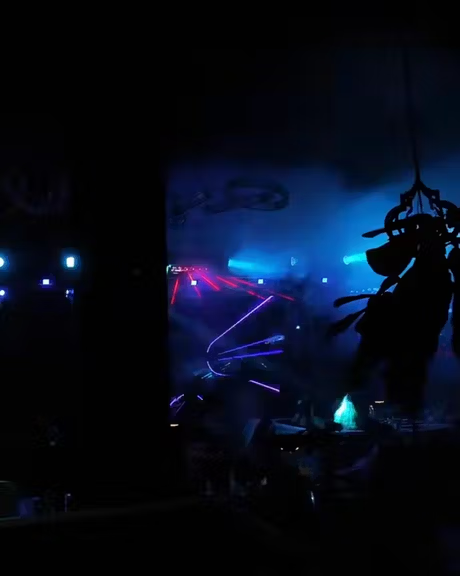
Security is tight. Two well-built bodyguards patrol the large saloon with lasers, flashing them on anyone who dares to stand up. “No dancing until 1 AM,” a second DJ announces.
At our table, we order salads, side dishes, and soft drinks. I add a splash of Aragh Sagi. A couple at the next table raises their glasses to us, smiling.
The hours pass in a blur of music, hushed toasts, and fleeting moments of stolen joy. Then, at 1 AM, the lights go out.
The dance begins
A deep bass vibrates through the floor. Strobe lights flash. And suddenly, everyone is on their feet. Girls in tight dresses, men in designer shirts—moving, shaking, celebrating a night that shouldn’t exist.
“No filming,” the DJ warns. “If you want us to host you again, keep your phones down. One video can shut this place down.”
A man beside me leans in, raising his voice over the music. “I just got back from Italy. Even there, you don’t find clubs running this late.”
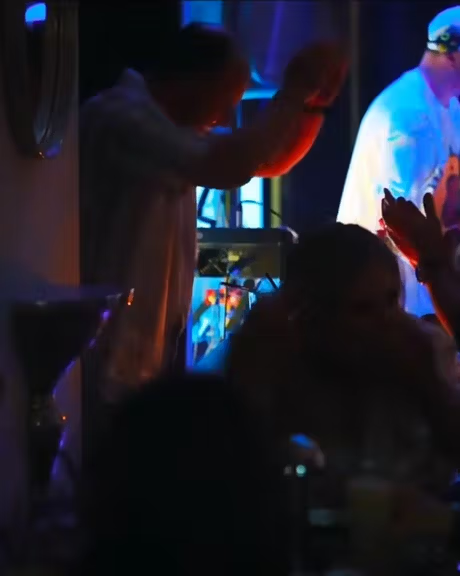
Another guest scrolls through Instagram, showing us pages of similar cafes holding parties in Fereshteh, Andarzgoo, and Aghdasieh—each promising luxury, secrecy, and freedom.
By 3:30 AM, we are stumbling out, buzzed on more than just alcohol. The bill? Sixty-five million rials (around $75) for a chicken salad, soft drinks mixed with Farid's vodka, and two beef sandwiches. But the cost is irrelevant.
“Let’s do this again next week,” my girlfriend says as we drive home. “It’s expensive, but still cheaper than a weekend in Dubai or Istanbul.”
She’s right. And as I reflect on the years we lost in fear, in silence, I regret not stepping into this world sooner.
This is Tehran. A city where, by day, women are harassed for loose headscarves, but by night, they dance in hidden saloons, reclaiming the freedom they refuse to surrender.